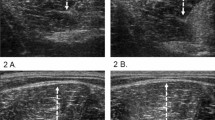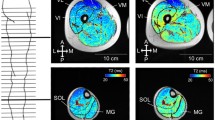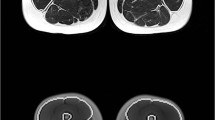Abstract
Exercise-induced shifts in signal intensity (SI) of magnetic resonance (MR) images were examined to assess indirectly muscle use in closed- and open-chain knee extensor exercises. Eight men performed five sets of 8–12 repetitions in the leg press (LP) and the seated knee extension (KE) exercises at 50, 75 and 100%, respectively of the 5×10 repetition maximum (RM) load. Prior to exercise and after each load setting, images of the thigh were obtained. The increase in SI (Δ SI) of the quadriceps at 100% load was greater (P<0.05) after KE (32.1±9.0%) than after LP (21.9±9.2%). Regardless of load, the four individual muscles of the quadriceps showed similar changes in SI after LP. The three vastii muscles showed comparable increases in SI after KE. M. rectus femoris showed greater (P<0.05) Δ SI than the vastii muscles at 100%. Neither exercise produced increase in SI of mm. semimembranosus, semitendinosus, gracilis or biceps femoris. Mm. adductor magnus and longus showed increased (13.3±6.5%; P<0.05) SI after LP, but not after KE, at 100% load. The present data also infer greater involvement of the quadriceps muscle in the open-chain knee extension than in the closed-chain leg press exercise. The results of the current investigation also indicate similar over-all use among the three vastii muscles in LP and KE, but differential m. rectus femoris use between the two exercises. This report extends the merits of the MR imaging technique as an aid to study individual muscle involvement in a particular exercise task.


Similar content being viewed by others
References
Adams GR, Duvoisin MR, Dudley GA (1992) Magnetic resonance imaging and electromyography as indexes of muscle function. J Appl Physiol 73:1578–1583
Akima H, Foley JM, Prior BM, Dudley GA, Meyer RA (2002) Vastus lateralis fatigue alters recruitment of musculus quadriceps femoris in humans. J Appl Physiol 92:679–684
Alkner BA, Tesch PA, Berg HE (2000) Quadriceps EMG/force relationship in knee extension and leg press. Med Sci Sports Exerc 32:459–463
Baratta R, Solomonow M, Zhou BH, Letson D, Chuinard R, D’Ambrosia R (1988) Muscular coactivation. The role of the antagonist musculature in maintaining knee stability. Am J Sports Med 16:113–122
Basmaijan JV, Deluca CJ (1985) Muscles alive. Their Functions Revealed by Elecromyography. Williams & Wilkins, Baltimore, USA
Basmaijan JV, Harden TP, Regenos EM (1971) Integrated actions of the four heads of quadriceps femoris: An electromyographic study. Anat Rec 172:15–20
Cohen MD (1991) Magnetic resonance imaging of the pediatric musculoskeletal system. Semin Ultrasound CT MR 12:506–523
Draganich LF, Jaeger RJ, Kralj AR (1989) Coactivation of the hamstrings and quadriceps during extension of the knee. J Bone Joint Surg Am 71:1075–1081
Eloranta V (1989a) Coordination of the thigh muscles in static leg extension. Electromyogr Clin Neurophysiol 29:227–233
Eloranta V (1989b) Patterning of muscle activity in static knee extension. Electromyogr Clin Neurophysiol 29:369–375
Eloranta V, Komi PV (1980) Function of the quadriceps femoris muscle under maximal concentric and eccentric contractions. Electromyogr Clin Neurophysiol 20:159–154
Escamilla RF, Fleisig GS, Zheng N, Barrentine SW, Wilk KE, Andrews JR (1998) Biomechanics of the knee during closed kinetic chain and open kinetic chain exercises. Med Sci Sports Exerc 30:556–569
Fisher MJ, Meyer RA, Adams GR, Foley JM, Potchen EJ (1990) Direct relationship between proton T2 and exercise intensity in skeletal muscle MR images. Invest Radiol 25:480–485
Fleckenstein JL, Canby RC, Parkey RW, Peshock RM (1988) Acute effects of exercise on MR imaging of skeletal muscle in normal volunteers. AJR Am J Roentgenol 151:231–237
Fleckenstein JL, Watumull D, McIntire DD, Bertocci LA, Chason DP, Peshock RM (1993) Muscle proton T2 relaxation times and work during repetitive maximal voluntary exercise. J Appl Physiol 74:2855–2859
Gough JV, Ladley G (1971) An investigation into the effectiveness of various forms of quadriceps exercises. Physiotherapy 57:356–361
Jenner G, Foley JM, Cooper TG, Potchen EJ, Meyer RA (1994) Changes in magnetic resonance images of muscle depend on exercise intensity and duration, not work. J Appl Physiol 76:2119–2124
Johnson MA, Polgar J, Weightman D, Appleton D (1973) Data on the distribution of fiber types in thirty-six human muscles. J Neurol Sci 18:111–129
Lehmkuhl LD, Smith LK (1983). Brunnstrom’s Clinical Kinesiology. F A Davis, Philadelphia
Lutz GE, Palmitier RA, An KN, Chao EY (1993) Comparison of tibiofemoral joint forces during open-kinetic-chain and closed-kinetic-chain exercises. J Bone Joint Surg Am 75:732–739
Meyer RA, Prior BM (2000) Functional magnetic resonance imaging of muscle. Exerc Sport Sci Rev 28:89–92
Palmitier RA, An KN, Scott SG, Chao EY (1991) Kinetic chain exercise in knee rehabilitation. Sports Med 11:402–413
Patten C, Meyer RA, Fleckenstein JL (2003) T2 mapping of muscle. Semin Musculoskelet Radiol 7:297–305
Ploutz LL, Tesch PA, Biro RL, Dudley GA (1994) Effect of resistance training on muscle use during exercise. J Appl Physiol 76:1675–1681
Ploutz-Snyder LL, Tesch PA, Crittenden DJ, Dudley GA (1995) Effect of unweighting on skeletal muscle use during exercise. J Appl Physiol 79:168–175
Ploutz-Snyder LL, Nyren S, Cooper TG, Potchen EJ, Meyer RA (1997) Different effects of exercise and edema on T2 relaxation in skeletal muscle. Magn Reson Med 37:676–682
Pocock G (1963) Electromyographic study of the quadriceps during resistance exercise. Am Phys Ther Assoc J 43:427–434
Prior BM, Foley JM, Jayaraman RC, Meyer RA (1999) Pixel T2 distribution in functional magnetic resonance images of muscle. J Appl Physiol 87:2107–2114
Salzman A, Torburn L, Perry J (1993) Contribution of rectus femoris and vasti to knee extension. An electromyographic study. Clin Orthop 1:236–243
Shellock FG, Fukunaga T, Mink JH, Edgerton VR (1991) Acute effects of exercise on MR imaging of skeletal muscle: concentric vs eccentric actions. AJR Am J Roentgenol 156:765–768
Signorile JF, Weber B, Roll B, Caruso JF, Lowensteyn I, Perry AC (1994) An electromyographical comparison of the squat and knee extension exercises. J Strength and Cond Res 8:178–183
Solomonow M, Baratta R, Zhou BH, Shoji H, Bose W, Beck C, D’Ambrosia R (1987) The synergistic action of the anterior cruciate ligament and thigh muscles in maintaining joint stability. Am J Sports Med 15:207–213
Takahashi H, Kuno SY, Katsuta S, Shimojo H, Masuda K, Yoshioka H, Anno I, Itai Y (1996) Relationships between fiber composition and NMR measurements in human skeletal muscle. NMR Biomed 9:8–12
Tepperman PS, Mazliah J, Naumann S, Delmore T (1986) Effect of ankle position on isometric quadriceps strengthening. Am J Phys Med 65:69–74
Yue G, Alexander AL, Laidlaw DH, Gmitro AF, Unger EC, Enoka RM (1994) Sensitivity of muscle proton spin-spin relaxation time as an index of muscle activation. J Appl Physiol 77:84–92
Acknowledgments
This research was supported by the Swedish National Center for Research in Sports (CIF). The technical assistance by Lena Norrbrand is acknowledged.
Author information
Authors and Affiliations
Corresponding author
Rights and permissions
About this article
Cite this article
Enocson, A., Berg, H., Vargas, R. et al. Signal intensity of MR-images of thigh muscles following acute open- and closed chain kinetic knee extensor exercise – index of muscle use. Eur J Appl Physiol 94, 357–363 (2005). https://doi.org/10.1007/s00421-005-1339-y
Accepted:
Published:
Issue Date:
DOI: https://doi.org/10.1007/s00421-005-1339-y




